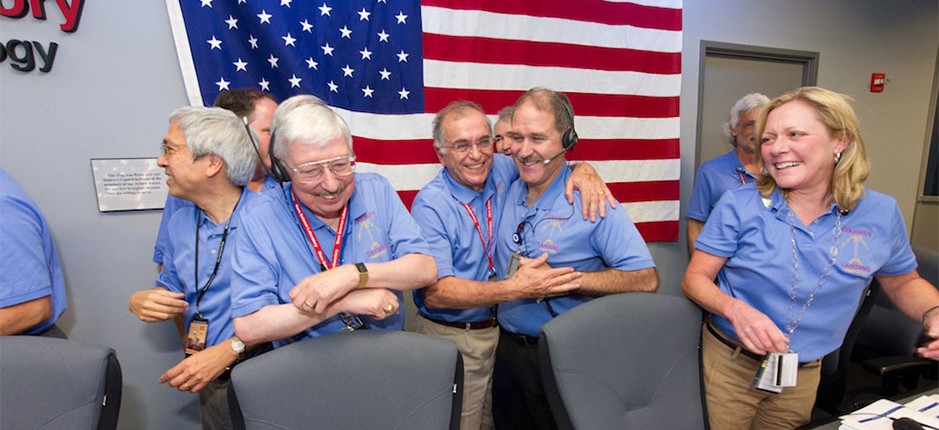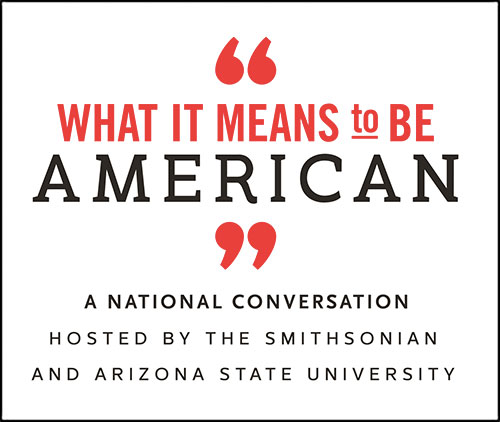
“Only the United States could do this.” Those words were uttered by the head of a foreign space agency who was one of my VIP guests at NASA’s Jet Propulsion Laboratory (JPL) in Pasadena, California, on August 5, 2012, the night the long-awaited Mars Curiosity rover landed successfully on the Red Planet. I’ll never forget hearing him say those words afterward, just outside JPL Mission Control, where engineers in charge of the mission were monitoring its vital signs. His words brought pride to my heart and tears to my eyes.
 No one had ever tried to land a 1-ton rover on Mars by lowering it down from a hovering rocket backpack. The Mars Science Laboratory/Curiosity mission was extremely challenging and daring, with hundreds of dedicated men and women developing brand new technologies. Even though everyone did exceptional work, a lot of things had to fire properly.
No one had ever tried to land a 1-ton rover on Mars by lowering it down from a hovering rocket backpack. The Mars Science Laboratory/Curiosity mission was extremely challenging and daring, with hundreds of dedicated men and women developing brand new technologies. Even though everyone did exceptional work, a lot of things had to fire properly.
At each critical time mark, they did. The landing was thrilling, and Mission Control erupted into cheers and hugs—all of it televised live for the whole world to see.
That night, I felt as though a time machine transported me to another day of great pride and meaning: August 24, 1979. On that day, I, along with other people from various countries around the globe, pledged allegiance to the American flag. I was sworn in as a citizen of the United States, a land I had admired since my childhood thousands of miles away, in the small town of Rayak, Lebanon.
How did a boy from an ordinary, middle-class family in a little Lebanese village come so far? The answer is deeply connected with what I believed as a child and I still believe today: The United States is a land of freedom and opportunity, where anything is possible, and where dreams can and do come true.
My small town of Rayak was near Baalbeck, where tourists came to see the world’s best-preserved major Roman temple. I met quite a few American visitors. Over and over again, I was struck by their open, positive attitude toward life, their attitude that anything is possible, no holds barred, regardless of family background, religion, or color. I sensed that Americans were not held back by the long-standing, ingrained systems and beliefs found in the Mideast, Europe, and other cultures, where one’s life path can be limited by social status, wealth, politics, and family connections.
Growing up in Lebanon, my views of the U.S. were partly shaped by my great love of American movies, and especially westerns. My heroes included John Wayne and Errol Flynn. They represented the American spirit of freedom and boldness, the belief that nothing is impossible, and that in the end, the good guys win and the bad guys lose.
As a boy, I also loved watching the expanse of stars in the clear night skies. Those stars helped inspire me to study hard in school. I was named the country’s top science student, an honor that gave me the opportunity to attend a college of my choice. I chose to study in Grenoble, France. I received a degree in physics from the University of Grenoble, and in engineering from the Polytechnic Institute. When it was time for graduate school, people encouraged me to try for the United States. I had the most positive thoughts about America, plus, I admit, I was rather attracted to the glitter and pizzazz depicted in Hollywood movies. I applied and was accepted to Caltech in Pasadena.
In Southern California, I found my new home and took advantage of its educational opportunities. I earned a master’s degree and a doctorate in electrical sciences from Caltech, a master’s in geology from UCLA, and a master’s in business administration from USC. My studies and degrees landed me a job at JPL in 1970, where my career since then has included work on Earth-observing missions, planetary exploration, and astrophysics. I have been JPL’s director since 2001.
I am happy to say that I have never experienced discrimination or limitations in the United States. I have been judged on my capabilities, not my background. In this nation of immigrants, especially in science and engineering, where people try new things and solve problems, they don’t ask where you’re from. Instead, they ask who is the best person to help overcome a challenge.
It’s remarkable that here immigrants can retain parts of their original culture. I can still savor my native Lebanese foods, like sfeeha meat pies and zaatar spice mix, while also sharing barbecued burgers on the Fourth of July. I can enjoy Lebanese music, festivities, and books while still embracing the larger American culture. In fact, I now live in a house that was built by Zane Grey, a classic American author who wrote about the Wild West that had captured my imagination as a boy.
In other countries, you just don’t find this merging of cultures, this melting pot. I think diversity truly enriches our society and makes the United States more intellectually and economically powerful. People from different backgrounds bring different ideas and thought processes. The best ideas rise to the top. I see that happen at NASA and JPL all the time. How else do you land a rover on a planet no human has ever visited, or design a robot to capture an asteroid?
Recently, we celebrated our diversity at JPL with our annual Heritage Night, where employees from various backgrounds serve samples of their native cuisine, with international music and dancing on a nearby stage. The amalgamation of backgrounds that make up JPL was on full display. As I savored food from Thailand, Spain, India, Poland, the United States, and other countries, l thought about how no one at JPL cares where you’re from, what color you are, what your religion is. When we need someone to analyze spectrometer data, calculate how much heat a spacecraft will encounter from the atmosphere of a distant planet, or improve our business systems, it doesn’t matter whether you’re a Muslim, a Christian, a Jew, or whether you were born in South America, Asia, Africa, or the United States. Your mind and your ideas—those are the things that matter.
I believe this uniquely American spirit of optimism, the sense that anything is possible for anyone, is a key reason our nation is the world leader in space exploration. I’ve personally seen it, for example, as the leader of the science team working with the radar instrument aboard the Cassini spacecraft. Cassini is an international mission that just celebrated its 10th year of exploring Saturn and its moons, including Titan. Whenever we encounter a particularly tough issue—such as a risky flyby through the plumes shooting up from Enceladus, or flying through the gaps between Saturn’s rings—our international partners have been amazed at our optimistic spirit, our can-do attitude, our firm belief that anything is possible.
That wonderful, very American spirit of opening doors, of pushing the frontier, of pursuing the seemingly impossible—that’s what exploration is all about. When the United States landed on the moon and Neil Armstrong took that one “small step” on the surface, when we landed a rover on Mars, when we deliberately collided with a comet to study its interior, all those milestones made people in the U.S. feel deep pride as Americans. But I also believe and hope that they made people around the globe feel deep pride as humans, pride in all the positive and amazing things we can accomplish when we work together.
I always tell this to my two American-born daughters, and I would say the same thing to anyone else born in the United States: You have no idea how fortunate you are. Although I wasn’t born here, as a naturalized citizen, I am honored and proud to be an American. And now, when I travel to various countries around the world, including Lebanon, I see the same look in the eyes of the little boys and girls that I probably had as a little boy meeting visitors from the U.S.
I hope I represent to them a great sense of optimism, and a figurative or literal path to the stars. I am always happy to share my views with those children. After all, some of them might grow up to be the next space explorers.




Send A Letter To the Editors